How to Prevent Fires in Garbage Trucks?
Learn why garbage trucks catch fire and how to prevent the mishap. Exclude hazardous waste, train drivers, use fire systems, and conduct inspections.
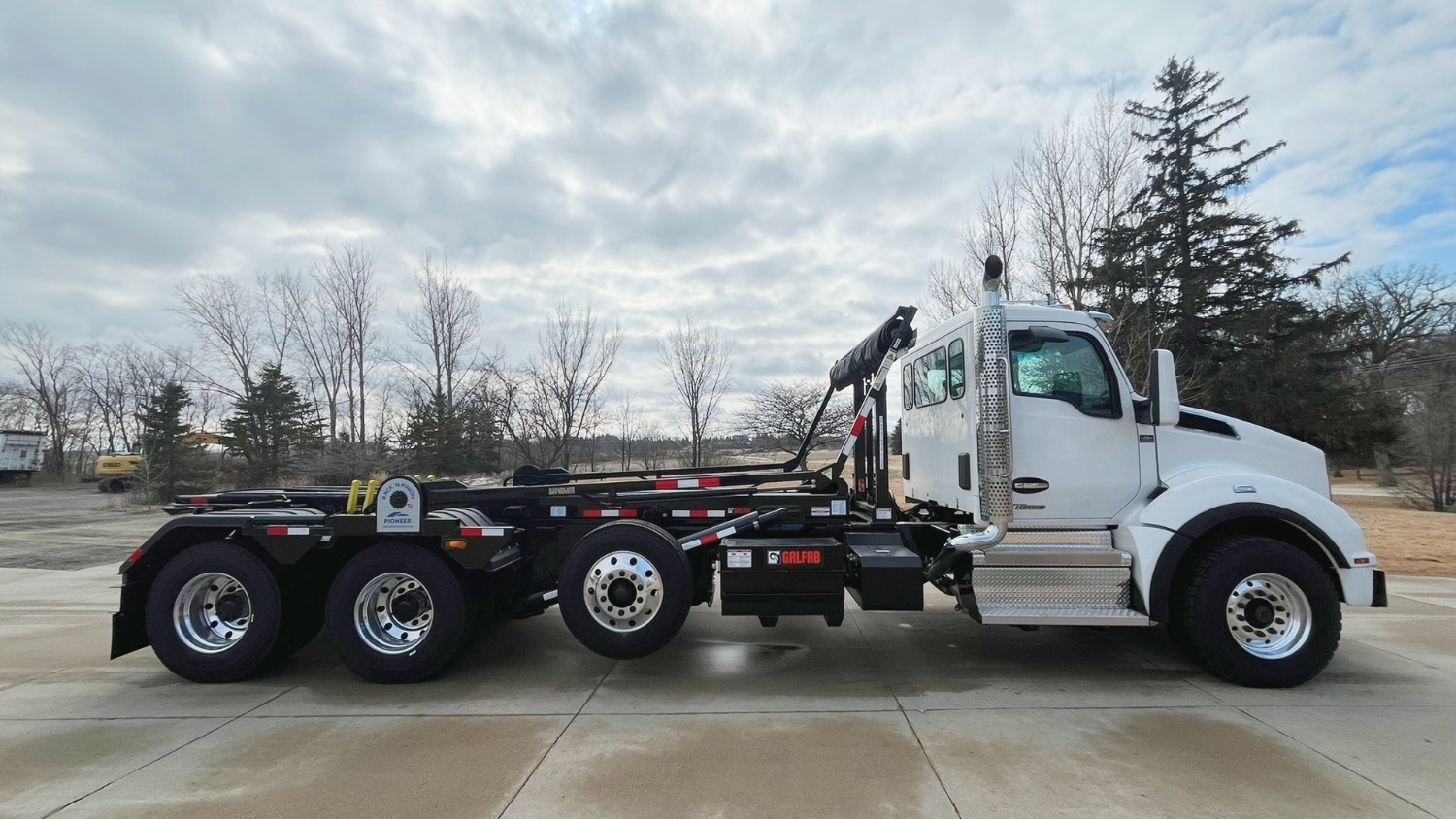
Learn why garbage trucks catch fire and how to prevent the mishap. Exclude hazardous waste, train drivers, use fire systems, and conduct inspections.

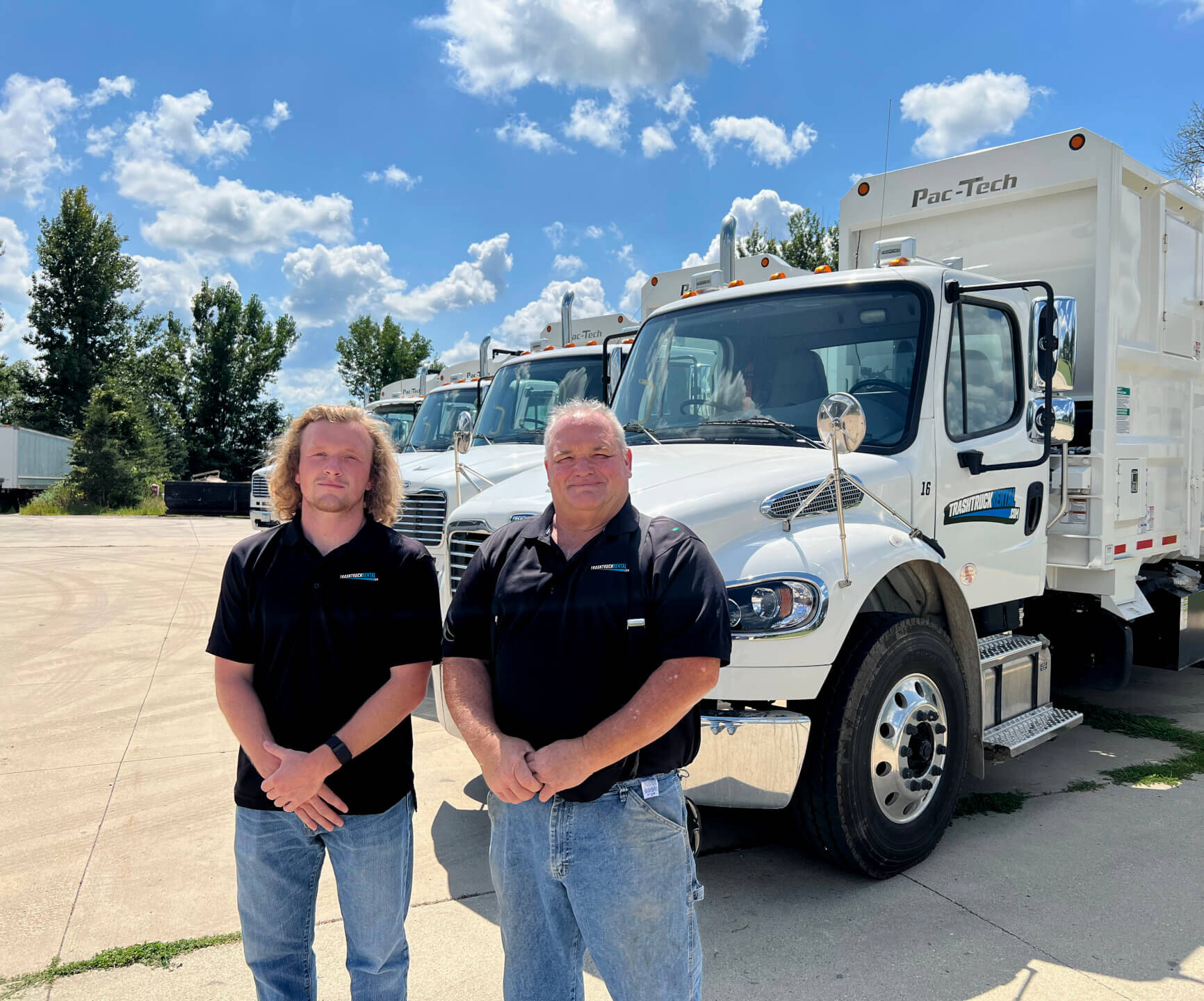
Garbage truck fires are a serious and often overlooked concern within the waste management industry, posing risks not only to the vehicles and equipment but also to personnel and public safety.
With the increasing volume of waste being handled and the difficulty of waste collection processes, understanding the causes of these fires and implementing effective preventive measures is more crucial than ever. These incidents disrupt waste collection services and lead to costly damages and potential environmental hazards. By addressing the root causes and taking proactive steps, waste management companies can significantly reduce the risk of fires and improve safety for their teams and communities.
Though comprehensive statistics on the exact frequency of garbage truck fires remain limited, industry reports highlight an alarming trend. For example, in 2024, the waste and recycling sector experienced 37 fires in October alone, with a significant portion of those fires attributed to collection vehicles. This statistic underscores the growing concern within the industry, signaling a need for heightened awareness and more stringent preventive measures.
The increase in fires could be linked to several factors, including the rise in hazardous waste disposal, aging truck fleets, and operational issues that often go unnoticed. As municipalities and waste management companies strive to meet the growing demand for waste services, the risk of fire-related incidents remains a critical issue that must be addressed through better training, maintenance, and technological intervention.
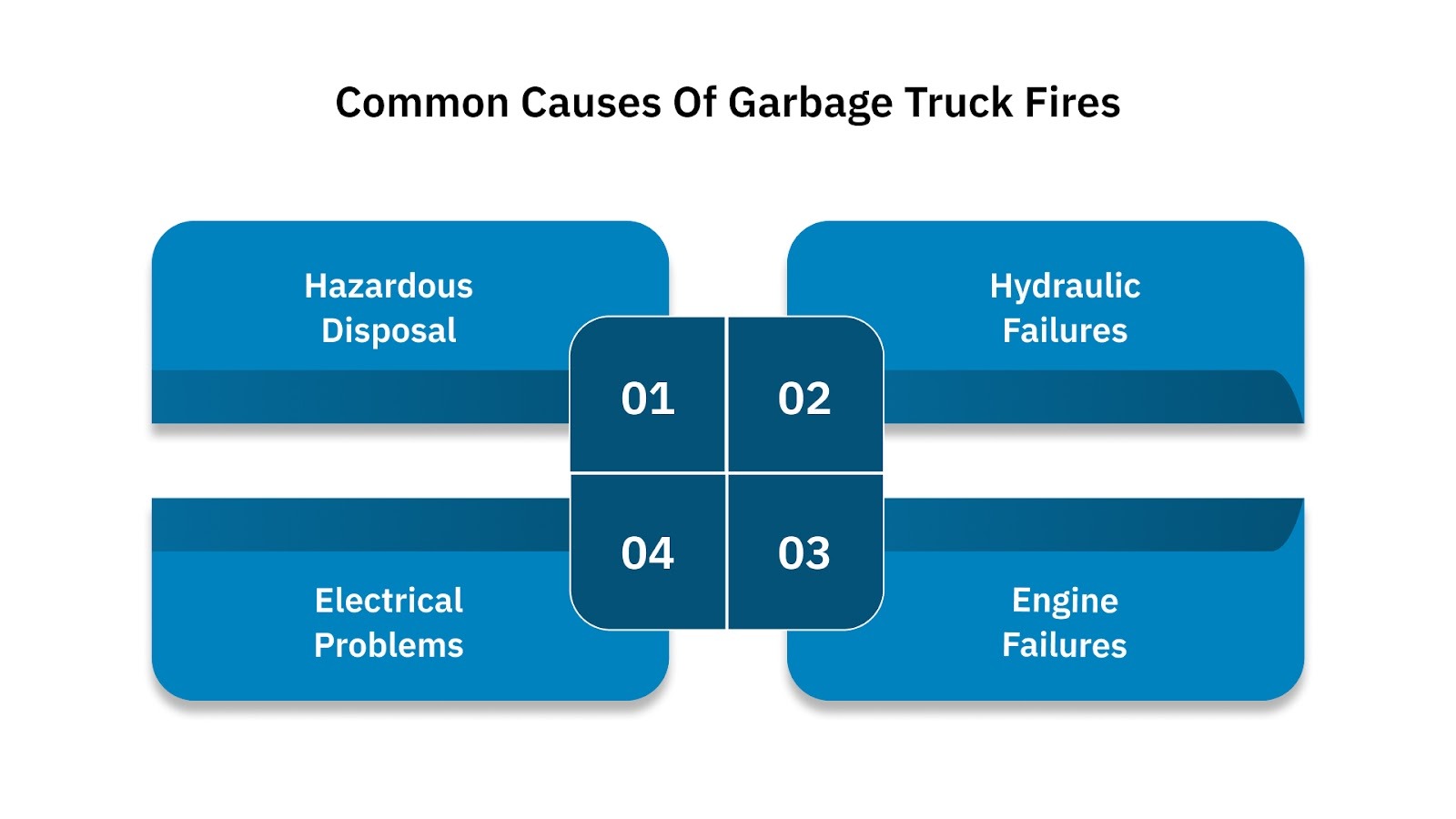
Understanding the key causes of these fires is crucial for implementing effective prevention strategies and ensuring the safety of waste management operations.
Improperly disposed of hazardous materials are one of the leading causes of fires in garbage trucks. Items like lithium-ion batteries and flammable liquids can ignite when subjected to the pressure and compacting action inside the truck's hopper. Even seemingly empty containers, such as used spray paint cans or partially drained fuel cans, can cause a fire when exposed to the intense heat generated during compaction. These items may react unexpectedly when compacted or crushed, potentially sparking a fire.
To mitigate this risk, it is vital to educate the public about proper disposal methods and encourage the use of designated recycling facilities for hazardous waste. Waste management companies must also invest in awareness campaigns and create clear guidelines on what can and cannot be thrown away in regular trash bins.
Here are some of the most common household items that are highly flammable and should never be disposed of in regular trash bins:
Hydraulic systems play a crucial role in operating garbage trucks, powering the lifting, compacting, and tipping functions. However, if hydraulic systems fail due to leaks or malfunctions, they can quickly turn into fire hazards.
Oil leaks, when combined with heat from the engine or exhaust, can ignite and spread rapidly throughout the vehicle. These fires can be particularly dangerous as they may start unnoticed and escalate quickly, especially if the hydraulic fluid is flammable.
Regular inspection and maintenance of the hydraulic system are essential in preventing such fires. Implementing a preventive maintenance schedule that checks for leaks, worn-out hoses, and hydraulic fluid levels can reduce the risk of such incidents. Keeping the hydraulic systems clean and replacing damaged components promptly will also help minimize fire risks.
Electrical failures are another common cause of garbage truck fires. Garbage trucks rely heavily on complex electrical systems to operate lights, signals, hydraulic systems, and other essential functions. Faulty wiring, corroded connections, or damaged components can cause electrical shorts, sparking fires that spread quickly. This issue is exacerbated by the truck's exposure to moisture, dirt, and debris, which can corrode wires and increase the risk of a short circuit.
Additionally, electrical fires are difficult to detect immediately, especially if they occur deep within the truck's system. Routine inspections of the electrical components, including wiring, batteries, and fuses, are necessary to detect potential issues before they lead to a fire. Regular cleaning and proper sealing of electrical systems can also prevent moisture buildup and debris accumulation, reducing the chances of electrical failures.
Overheating in the engine and exhaust systems is a significant fire risk in garbage trucks. The high temperatures generated by the engine can ignite nearby combustible materials, especially if there is an oil leak or accumulated debris in the exhaust system.
Garbage trucks often travel through areas with heavy dust or debris, which can accumulate around the engine and exhaust components, increasing the risk of fire. Oil leaks, if not addressed promptly, can cause fires, particularly when combined with the heat produced by the engine or exhaust. To prevent such fires, it is crucial for waste management companies to conduct regular checks and cleanings of the engine and exhaust system.
Replacing damaged seals, addressing oil leaks immediately, and ensuring proper ventilation for the engine can significantly reduce the likelihood of fire-related incidents. Keeping the truck's engine and exhaust system free of debris will also help prevent the buildup of flammable materials.
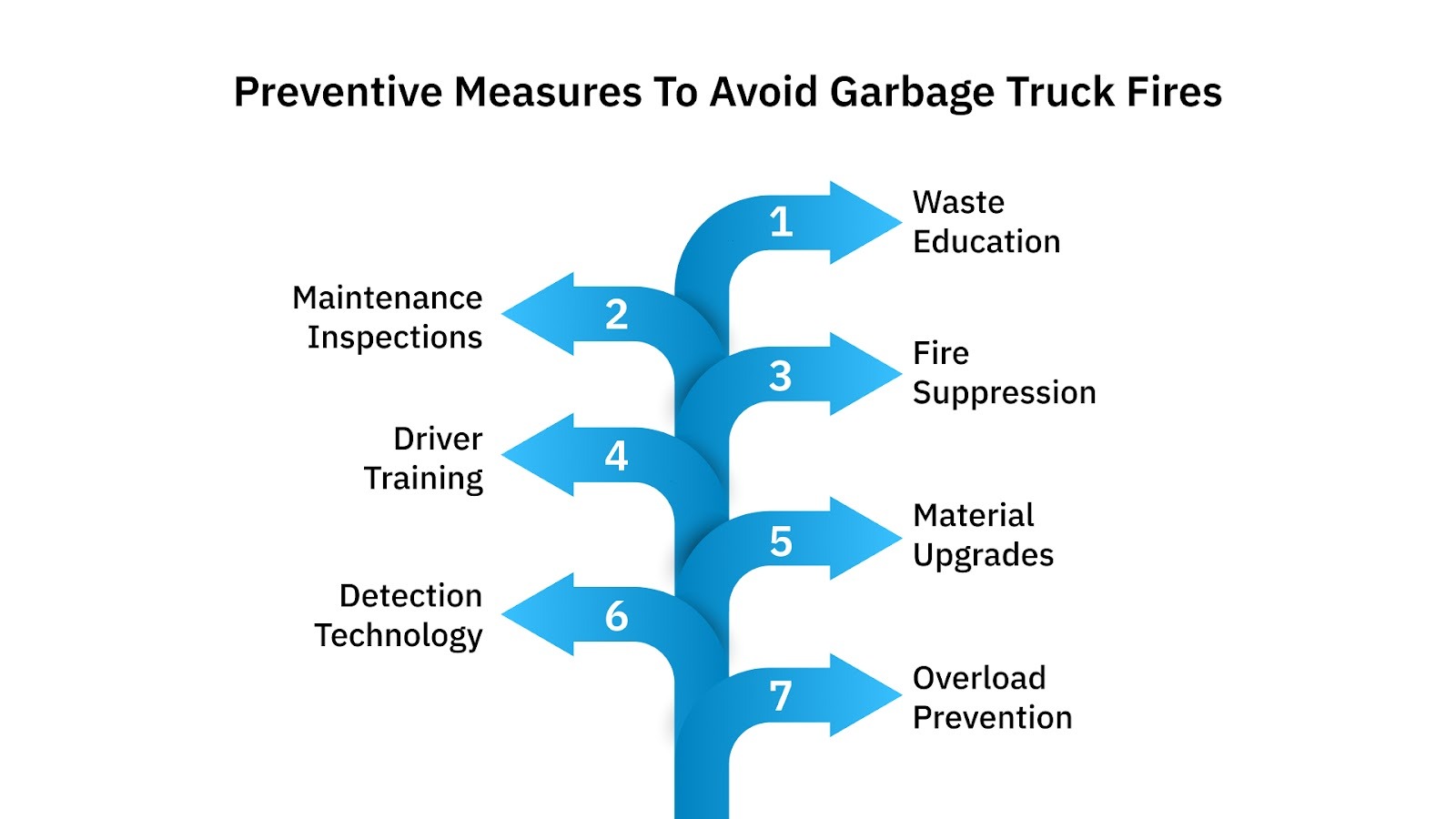
Now that we have explored the common causes of garbage truck fires, it is essential to focus on preventive measures that can help mitigate these risks and ensure safe, efficient operations. Implementing a combination of best practices, safety protocols, and the right technology is crucial in reducing fire incidents in garbage trucks.
As improper disposal of hazardous materials is a leading cause of fires, educating the public about what should and shouldn’t be disposed of in regular trash is essential. Municipalities and waste management companies can set up informational campaigns, provide clear signage on trucks, and use digital platforms to raise awareness about hazardous waste. These campaigns can emphasize the importance of disposing of items like batteries, electronics, and chemicals at designated recycling or hazardous waste drop-off locations.
In addition, encouraging the use of eco-friendly alternatives to hazardous products can also reduce the amount of dangerous waste being disposed of improperly.
Preventive maintenance is one of the most effective ways to ensure garbage trucks remain in good working condition and reduce the risk of fire. Regular inspections should be carried out, focusing on key areas such as the hydraulic system, electrical components, engine, and exhaust system. By identifying and addressing issues like leaks, damaged wiring, and overheating components early, maintenance teams can prevent small problems from escalating into major safety hazards. Routine checks and timely repairs are essential to ensure all systems are operating efficiently and safely.
Additionally, waste management companies should establish maintenance schedules for each vehicle, based on usage and manufacturer recommendations, to ensure that no area of the truck goes unchecked for an extended period.
One of the most effective ways to address the risk of fire in garbage trucks is through the installation of fire suppression systems. These systems are designed to detect and suppress fires automatically, minimizing damage and potentially saving the vehicle and the driver. Advanced fire suppression systems can detect heat or smoke and discharge fire retardants to control the fire before it spreads.
For waste management companies, installing these systems in high-risk areas, such as the engine compartment, hydraulic system, and undercarriage, can be a crucial safety investment. Fire suppression systems offer an additional layer of protection, especially for trucks operating in high-temperature environments or areas with dense debris.
Proper driver training plays a vital role in preventing garbage truck fires. Drivers should be trained to recognize the early warning signs of a potential fire, such as unusual smells, smoke, or changes in engine temperature. In addition to recognizing these signs, drivers must be familiar with emergency procedures, including how to safely evacuate the vehicle, use onboard fire extinguishers, and contact emergency services quickly.
Waste management companies should conduct regular safety drills to ensure that drivers are well-prepared for fire emergencies. These drills should cover fire prevention, the proper use of fire extinguishers, and the procedures for stopping the truck safely in the event of a fire. Encouraging safe driving practices, such as avoiding sudden stops or excessive engine idling, can also help prevent overheating and reduce the likelihood of fire.
Upgrading to fire-resistant materials in the construction of garbage trucks can help reduce the risk of fires. For example, using heat-resistant hoses, fireproof insulation around electrical components, and fire-resistant panels for engine compartments can minimize the chances of a fire starting in these areas.
Furthermore, waste management companies can invest in trucks with advanced safety features such as automated fire detection and suppression systems, which are built to address fire risks in real-time.
Incorporating technology for real-time monitoring of a garbage truck’s systems can significantly enhance safety. Sensors that track engine temperature, hydraulic pressure, and even exhaust system conditions can alert the driver or maintenance team to any anomalies before they turn into dangerous situations. Additionally, some modern garbage trucks are equipped with thermal imaging cameras, which can detect temperature anomalies, enabling immediate action to be taken before a fire starts.
Real-time tracking of truck performance allows fleet managers to monitor the overall health of the vehicle, ensuring that any potential fire hazards are identified early on and addressed before they pose a threat.
Overloading garbage trucks can lead to overheating and excessive strain on the truck’s components, increasing the likelihood of fires. Proper training on weight limits and load distribution can help drivers ensure the truck is loaded safely and within capacity.
Implementing a clear policy that restricts overloading can help reduce the risk of fire, as overloaded trucks are more prone to mechanical failures that could lead to ignition.
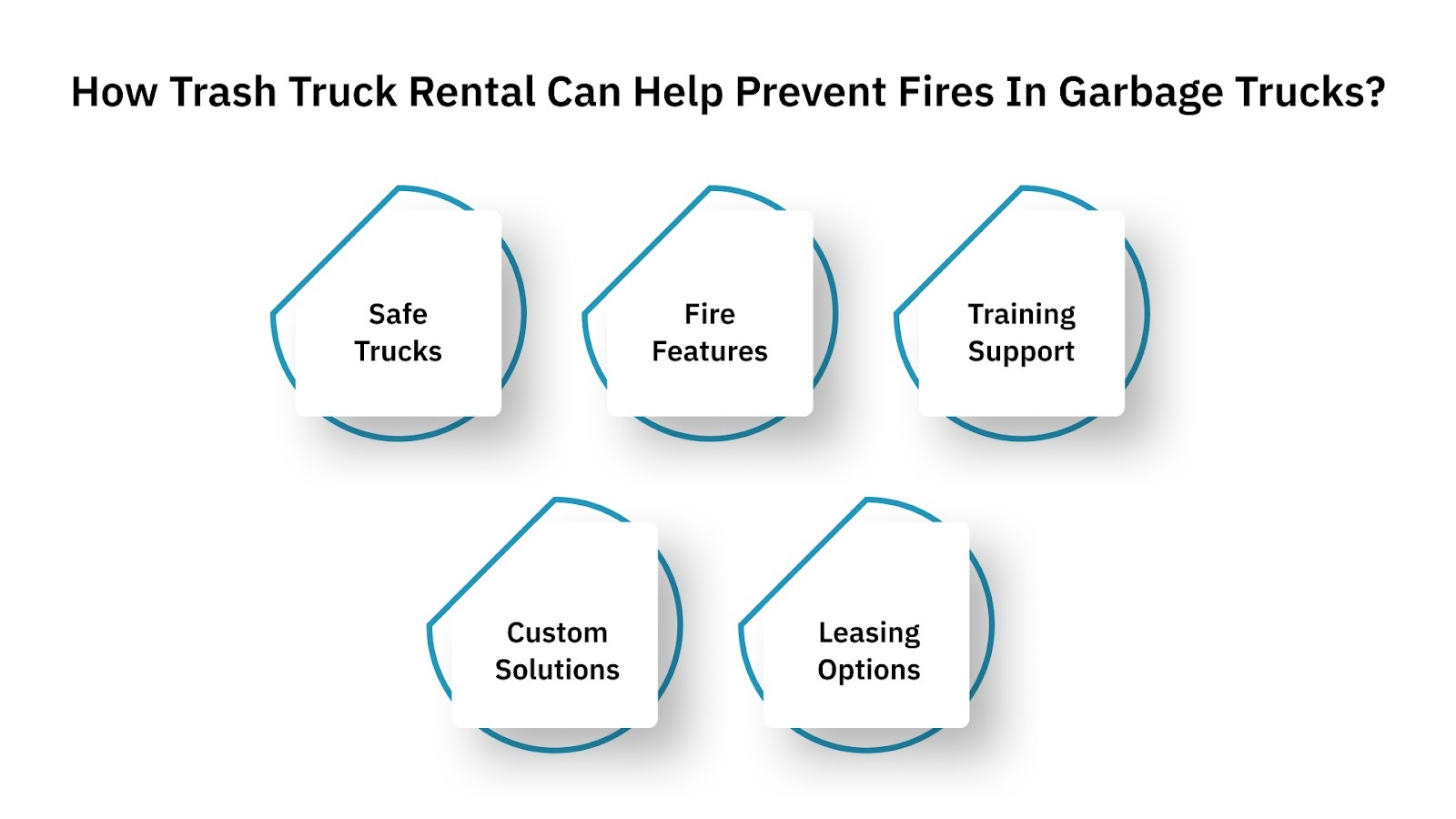
At Trash Truck Rental, we understand the risks associated with garbage truck fires and are committed to providing safe, reliable, and well-maintained vehicles that minimize these risks. We take several steps to ensure that the trucks we offer are equipped with the latest safety features and are maintained to the highest standards, reducing the likelihood of fire hazards.
Each truck in our fleet undergoes thorough inspections and regular maintenance to ensure it is in optimal working condition. Our preventive maintenance programs focus on the key components that are essential for fire prevention, including the hydraulic systems, engine, exhaust system, and electrical components. By offering trucks that are consistently serviced and well-maintained, we ensure that our vehicles are safe, reliable, and ready to perform at their best.
Our Automated Sideload Trucks, ideal for curbside residential pickup, are equipped with the latest safety technology to prevent malfunctions that could lead to fire risks. Our Roll-Off Trucks, used for larger commercial projects, come with well-maintained hydraulic systems and advanced fire suppression technology to ensure safety in high-risk environments.
We are committed to providing garbage trucks equipped with advanced fire safety features. Many of our trucks come with fire suppression systems that can quickly detect and suppress fires, reducing the potential for damage and increasing safety during operations. These systems play a crucial role in minimizing fire risks and ensuring that our trucks operate safely, even in high-risk environments.
We recognize that driver education and awareness are vital to preventing garbage truck fires. In addition to providing well-maintained trucks, we offer training resources for your drivers. Our training programs cover fire safety, proper waste disposal practices, and how to recognize and handle potential fire hazards. By equipping drivers with the knowledge they need to operate trucks safely, we reduce the risk of fire-related incidents and enhance overall operational efficiency.
Whether you require rear-load trucks, automated side loaders, or roll-off trucks, Trash Truck Rental provides customized solutions that meet your specific operational needs. Our trucks are designed with both performance and safety in mind, ensuring that each vehicle is optimized for the job at hand. With our wide range of trucks and flexible leasing options, you can find the ideal solution for your waste management operations, without compromising on safety or reliability.
Each truck type offers specific features that reduce the chances of fire risk. For example, Roll-Off Trucks are designed with extra-large containers that help distribute weight more evenly, reducing strain on the truck’s engine and minimizing overheating risks.
Our flexible leasing options allow you to choose the perfect truck for your needs, whether you require a truck for a short-term project or a longer-term operational solution. With terms ranging from 28 days to two years, you can scale your fleet and adjust as needed without worrying about long-term commitments. This flexibility allows waste management companies to adjust their fleet based on seasonal demand or fluctuating operational requirements.
Also Read: How Renting Garbage Trucks Can Save Small Haulers from Winter Woes
Garbage truck fires are a serious concern in waste management, but with proactive measures, they can be significantly reduced. By educating the public on proper disposal methods, implementing regular maintenance schedules, installing fire suppression systems, training drivers, upgrading to fire-resistant materials, and utilizing advanced monitoring technology, waste management companies can mitigate the risks of fire and enhance safety for their teams and the public.
At Trash Truck Rental, we understand the importance of safety and reliability in waste management operations. That's why we provide flexible rental and purchase options for high-quality, well-maintained trucks equipped with the latest safety features. We serve private waste management companies and municipalities primarily within Minnesota, Wisconsin, and Iowa, with an openness to nationwide sales. Our commitment to customer service and safety ensures that your operations run smoothly and safely, reducing the likelihood of fire hazards in your fleet.
Contact us today to learn more about how we can support your waste management needs with reliable and safe truck rental solutions.
Items such as lithium-ion batteries, aerosol cans, flammable liquids, and electronics should never be placed in regular trash. These items should be taken to designated recycling or hazardous waste disposal facilities.
Signs of a hot load include smoke emanating from the truck, unusual odors, or visible heat waves. Drivers should be trained to recognize these signs and take immediate action to prevent fires.
Yes, some municipalities have implemented thermal imaging cameras in garbage trucks to detect temperature anomalies and potential fire hazards before they escalate.
Drivers should safely stop the vehicle, evacuate the area, and contact emergency services. If trained, they may attempt to suppress the fire using onboard fire extinguishers.
Companies can implement regular maintenance schedules, provide driver training, install fire suppression systems, and educate the public on proper waste disposal to mitigate fire risks.
Ready to Upgrade Your Process Operations?